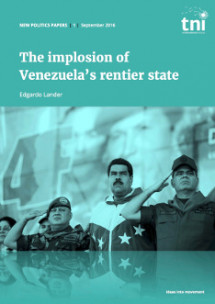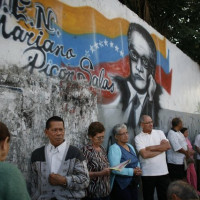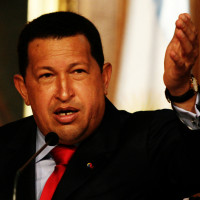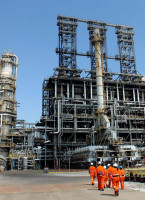The implosion of Venezuela's rentier state
Temas
Regiones
The current crisis of the Bolivarian project is due to its failure to question the rentier petro-state model. Far from accepting that an alternative to capitalism necessarily had to be a departure from the destructive development model of unlimited growth, the government of President Chávez intensified it to extremes unknown in the country’s previous history.

Autores
The main trigger of the crisis Venezuela is undergoing today – though obviously not its only cause – was the collapse in oil prices over the last three years. From US$100 per barrel in 2013, the average price of Venezuelan crude went down to US$88.42 in 2014 and US$44.65. in 2015, falling to its lowest level in February 2016, when it was worth just US$24.25. Far from accepting that an alternative to capitalism necessarily had to be a departure from the destructive development model of unlimited growth, and far from questioning the rentier petro-state model, the government of President Chávez intensified it to extremes unknown in the country’s previous history.
Over the 17 years of the Bolivarian project, the economy became steadily more dependent on oil income. Without that income, it would not have been possible to import the goods required
to meet people’s basic needs, including a wide range of items that used to be produced in Venezuela. During that time, welfare policy was seen as more of a priority than changing the economic model. Income poverty was reduced, but without altering the structural conditions that perpetuate exclusion.
Identifying socialism with statism, the Bolivarian government took forward a series of nationalisations which expanded the scope of the state far beyond its capacity to manage everything. As a result, the state today is bigger but also weaker and more inefficient, less transparent and more corrupt. The extensive involvement of the military in the management of state-owned enterprises has contributed significantly to those outcomes.
If they are still operating at all, most of the companies that were brought under state control only manage to carry on thanks to being subsidised by oil revenues. Both the social policies – which significantly improved people’s living conditions – and the many Latin American solidarity and integration initiatives promoted by the Venezuelan government were only possible thanks to high oil prices. Ignoring historical experience regarding the cyclical nature of commodity prices, the government operated as though the oil price was going to remain above US$100 per barrel indefinitely.
Given that oil came to account for 96% of the total value of the country’s exports, practically all the foreign exchange that came into the country during the last few years did so via the state. A controlled exchange rate policy worsened an unsustainable pegging of the local currency to the dollar, meaning that the entire economy was being subsidised. The exchange rate differentials that characterised this policy reached more than a hundred to one. Compounded by the discretionality with which the officials responsible are able to decide whether or not to provide the
foreign currency applied for, this meant that the management of dollars became the principal breeding ground of corruption in the country.
During the years of plenty, all the surplus fiscal revenue was spent, and the country even racked up high levels of debt. No reserve funds were set aside for when the oil price went down. When it did collapse, the inevitable happened: the economy fell into a deep, long-lasting recession and chavismo’s political project began to founder.
GDP shrank by 3.9% in 2014 and 5.7% in 2015. ECLAC forecasts a 7% fall in 2016. The fiscal deficit is significant and growing. According to ECLAC, the external debt doubled between 2008 and 2013. Although it is not yet alarming as a percentage of GDP, the drastic reduction in foreign exchange income makes the debt difficult to pay. The country’s international reserves have fallen heavily. Reserves in June 2016 were equivalent to just 41% of what they were at the end of 2012. Access to new international funding is limited by the uncertainty that surrounds the future of the oil market, the country’s inability to access western financial markets, and the very high interest rates it is currently required to pay.
Added to this is the highest rate of inflation in the world. According to official figures, inflation hit 180.9% in 2015, while for food and nonalcoholic drinks it was 315%. This is undoubtedly an underestimate. For this year no official figures are available, but inflation in the first six months was very much higher than last year’s rate, particularly for food. This severe economic recession could lead to a humanitarian crisis. There are widespread shortages of food, medicines and household products. Venezuelan families are having to spend more and more time going to
different shops and queuing in search of food that they can afford. People are cutting back on food consumption significantly. Based on data up to 2013, the FAO published an “acknowledgement of noteworthy and exceptional progress in combating hunger,” noting that less than 6.7% of Venezuelan people were malnourished.
Since then, the situation has changed to one where people find it increasingly difficult to obtain food and where hunger has become the subject of everyday conversation. According to the latest official statistics, there has been a sustained reduction in the consumption of practically all categories of food since 2013. In some cases the reduction is very pronounced. Between the
second half of 2012 and the first six months of 2014, consumption of milk fell by more than half. These figures are from before the shortages got worse and inflation spiked over the past year.
Surveys find that an increasing number of families have stopped eating three times a day, while the percentage of families who state they only eat once a day is also rising. According to the polling firm Venebarómetro, the vast majority of people (86.3%) say that they are buying less or much less food than before.
The situation with regard to access to medicines and health services is equally critical. Hospitals and health centres report severe shortages of basic supplies and a lack of medical equipment and instruments due to the difficulty of obtaining spare parts and other supplies, both locally produced and imported. It is common to find that hospitals and health centres are unable to treat or feed patients unless their family members bring the necessary supplies and food. Operations are frequently postponed due to the lack of equipment, supplies or medical staff. Many
patients requiring dialysis are not receiving treatment. There is a severe shortage of essential medicines for treating diseases such as diabetes, high blood pressure and cancer.
The government refuses to acknowledge the possibility that the country is on the verge of an emergency that will require outside help. One reason is that this would be seen as an admission of the government’s own failure. But it also wants to avoid such an acknowledgment being used as an invitation to mount a humanitarian intervention operation – armed if necessary – with the predictable consequences.
Over the last few years the government has launched various operations and mechanisms to distribute food. These have not lasted for long and usually failed due to inefficiency and the very high levels of corruption. They have not managed to dismantle the mafia networks – both governmental and private – which operate at every stage of the distribution and supply chain, from the ports to retail sales outlets.
Furthermore, all these mechanisms have focused on the distribution side, without systematically addressing the serious crisis in domestic production.
The latest initiative is the Local Supply and Production Committees (Comités Locales de Abastecimiento y Producción - CLAP), which are mainly aimed at selling bags of certain subsidised food products directly to households. This mechanism has proved very controversial, among other reasons because there is not enough food available to supply everyone, and because it operates partly through governing party (PSUV) structures. The committees have only been operating for a very short time, but many complaints have already been expressed, both about their political nature – they are said in many cases to exclude those who do not identify themselves as government supporters – and, once again, about corruption.
With the exception of Caracas, electricity was rationed for months in 2016, with power cuts lasting for four hours a day. To save electricity, government offices all over the country only worked two days a week for months and then for a reduced number of hours per day, weakening the Venezuelan state’s already diminished capacity to run the country still further. The water supply has also been rationed, disproportionately affecting low-income groups. There is an equally severe crisis in public transport due to the lack of spare parts, even the most common ones such
as batteries and tyres.
All this has led to a serious deterioration in people’s living conditions, meaning that the social improvements achieved in previous years are rapidly being lost. The government has stopped publishing the main economic and social statistics, or only publishes them with a lengthy time lag. The only sources of up-to-date figures are therefore a few university studies and private polling firms. In the latest study published by a multiuniversity research project,14 looking at income and people’s ability to afford what is defined as the standard food basket, 75.6% of the
population is described as poor and half are classified as extremely poor. More than a deterioration, this represents a complete collapse in the purchasing power of the majority of the population.
The fall in purchasing power is widespread, but it does not affect all sectors of the population equally. This means that social inequalities are getting worse. The reduction in income inequality was one of the Bolivarian project’s most important achievements. The current deterioration in purchasing power mainly affects those who live on a fixed income, such as salaried workers and pensioners. In contrast, those who have access to the foreign currency that can buy ever more bolívares, and those who are involved in the many forms of speculation in the informal economy known as bachaqueo, often end up benefiting from the shortages and inflation. Current conditions mean that the government no longer has the resources it needs to more than partially supply food to the people through large-scale import programmes. For the same reasons, the impact of the social policies known as “missions” is steadily being eroded.
In fact, the government’s current economic policy operates as an adjustment policy that contributes to the deterioration in people’s living conditions. Paying the external debt is seen as more of a priority than the food and health needs of the Venezuelan people. According to the then Vice-President for the Economy, Miguel Pérez Abad, Venezuela will cut back substantially on non oil-related imports this year in order to meet its debt repayment commitments. It has been announced that the total amount of foreign exchange available for non-oil imports in 2016 will be
just US$15 billion, enough to buy only a quarter of the imports bought in in 2012. Nevertheless, President Maduro has reported that “...over the last 20 months, the Venezuelan state has paid US$35 billion to our international creditors...” This is extraordinarily serious, given the high level of dependence on imports to meet people’s basic food and health needs.
Various proposals have been formulated by political and academic organisations, as well as popular movements, for possible ways to obtain the resources needed to meet the people’s urgent needs. One of the most outstanding of these is the Public Citizen Audit Platform (Plataforma de Auditoría Pública y Ciudadana) which is calling for an in-depth investigation of the extraordinary level of corruption that has affected the procedures whereby state institutions hand over subsidised foreign currency for imports. Such an audit would make it possible to start recovering the funds stolen from the nation. This proposal has been rejected by the government. It would be like opening Pandora’s box and would undoubtedly implicate high-ranking public officials – both civilian and military – as well as private businesses.
Equally important would be an audit of the external debt, in order to identify how much of it is legitimate and how much is not. This information could be used to renegotiate debt payment conditions, based on the argument that meeting people’s immediate food and health needs takes priority over paying creditors. Another proposal is to levy an extraordinary tax on the assets of Venezuelans living abroad, together with tax reform to increase the amount paid by the wealthy, especially those in the financial sector, who currently pay very low taxes.
It goes without saying that none of this would have much of an impact unless effective social oversight mechanisms are created to ensure that these resources reach the people who need them, in a context of widespread corruption.
To read the full paper, download it here





